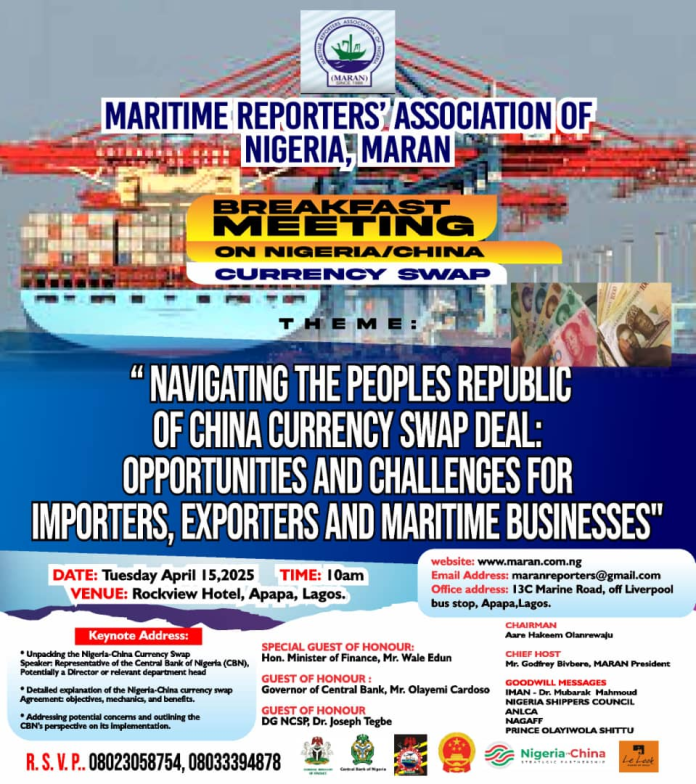*NPA, NSC, NAGAFF, Others Support Deal
Stakeholders who participated in the just concluded Maritime Reporters Association of Nigeria (MARAN) breakfast meeting have lend their support to the Nigeria-China currency swap deal.
The stakeholders who converged at the venue of the breakfast meeting at Rockview Hotel, Apapa, Lagos on Tuesday April 15, 2025 described the currency swap deal as a welcome development that would ease trade between Nigeria and the People’s Republic of China.
Among other participants at the event, the Nigerian Ports Authority (NPA), Nigerian Shippers Council (NSC), and the National Association of Government Approved Freight Forwarders (NAGAFF) all lent their support to the currency swap deal.
In line with the assertion of the Governor of Central Bank of Nigeria (CBN), Mr. Olayemi Cardoso that “Nigeria-China currency swap deal” pursues the use of the currency of both countries, Naira and Renminbi for trade transactions, against the United States of America (USA) dollar, these stakeholders unanimously agreed it will reduce transaction cost and time eventually.
Cardoso had explained in a paper presented on his behalf by his Special Adviser on Finance and Strategy, Mr. Anthony Ogufere that the currency swap deal was backed by the apex banks of both countries and was signed in 2018 and renewed in December 2024.
The CBN helmsman noted that the breakfast meeting with the theme “Navigating the Nigeria-China Currency Swap: Opportunities and Challenges for Import, Export, and Maritime Business”, was beneficial since Nigeria’s major imports come from China.
He argued that the currency swap between both countries will aid trade efficiency just as he pointed out that China accounts for 35 per cent of imports into Nigeria.
According to him, the Nigeria-China currency swap deal is an initiative of the CBN and it will reduce transaction cost by ensuring businesses between the two countries are carried out using their local currencies.
NPA in its goodwill message lauded MARAN for coming up with the idea of a breakfast meeting on Nigeria-China currency deal.
The authority which was represented at the event by its Port Manager, Lagos Port Complex (LPC), Mr. Lawal wondered why the USA dollar exchange rate still remains the benchmark for transactions despite the currency swap deal between both countries.
The CBN clarified that the dollar exchange rate is being used in the interim as a notional anchor to help with a view of adjustments when there is a lot of trade and settlements, just as Nigeria gradually adjusted from British Pound Sterling to the USA dollar in the past.
The Executive Secretary, NSC, Dr. Pius Akutah on his part described the currency swap deal as a welcome initiative because its benefits outweigh the demerits.
Akutah called for an extended forum on the topic involving the Manufacturers Association of Nigeria (MAN) and Nigerian Association of Chambers of Commerce, Industry, Mines and Agriculture (NACCIMA) “because we are considering using this initiative for capital projects such as infrastructure development, vessel acquisition whether in Agriculture or maritime sectors.”
According to him, China has taken over from South Korea as the largest manufacturer of vessels to the extent that even South Korea goes to China for purchase of small vessels as well as ship repairs.
The NSC helmsman lauded the CBN for the currency swap initiative and enjoined those who are conversant with the deal to increase awareness and sensitization through the media.
NAGAFF on its part, emphasized that a currency swap between Nigeria and China has far-reaching implications for transaction costs, trade volume, and the operational dynamics of various business sectors, including importers, exporters, and maritime businesses.
NAGAFF Secretary General, Mr. Godfrey Emeka Nwosu who represented its National President, High Chief Tochukwu Ezisi noted that these potential effects include significant reduction in foreign exchange conversion cost as Nigeria and China will directly exchange goods and services using their local currencies which ends in decreased costs associated with currency conversion.
He added that it will boost trade efficiency and growth, hence, a resultant increase in trade volume as businesses can engage in cross-border trade with remarkable efficiency.
He noted that the initiative will generally impact on maritime business through reduced shipping costs, among other benefits.











